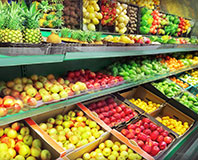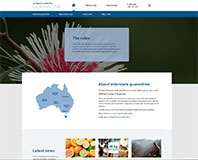Read the latest information on
Foot-and-mouth disease

There are rules about moving plants and plant products within Australia to protect the environment and primary producers from pests and diseases
In addition to the restrictions on what can be brought into Australia from overseas, there are also rules about what can be moved around Australia. This is to prevent the spread of plant pests and diseases from one area of the country to another.
To help people comply with the rules, and just in time for summer holiday season, there’s a new website for Australian Interstate Quarantine requirements for both travelling public and producers sending consignments of fruit and veggies to markets.
 Rod Turner, chair of the Subcommittee on Domestic Quarantine and Market Access that oversees work in this area, said that previously separate sites were now combined into one, and that the public could see why they were being asked to comply with the rules and the potential impact on growers if they don’t.
Rod Turner, chair of the Subcommittee on Domestic Quarantine and Market Access that oversees work in this area, said that previously separate sites were now combined into one, and that the public could see why they were being asked to comply with the rules and the potential impact on growers if they don’t.
“It’s important for the travelling public to comply with the requirements to protect the livelihoods of producers, trade market access and the environment,” said Rod.
There’s a gallery of the who’s who of pests in Australia that the various states and territories don’t have and are trying to keep out.
The launch of the site coincides with an update to the information in the booklet Australian Interstate Quarantine: A Traveller’s Guide, which includes information about what can and cannot be moved between and within states and territories.
“A quick check before travelling or transporting goods can help avoid any on-the-spot fines that may apply,” advised Rod.
“Producers too benefit from having all the latest news, contact details for quarantine regulators and documentation in the one place.”
Interstate Certificates of Assurance are still available in familiar lists by state, but can now also be found by entering an ICA number, state, pest, type of produce or required treatments.
The Australian Interstate Quarantine website is at www.interstatequarantine.org.au, and copies of the Traveller’s Guide can be downloaded from the site or hard copies obtained from border biosecurity officers and at visitors’ centres around the country.